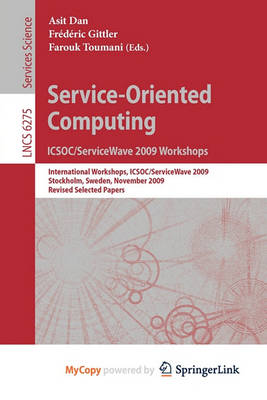Lecture Notes in Computer Science
1 primary work
Book 6275
Service-Oriented Computing. Icsoc/Servicewave 2009 Workshops
Published 6 October 2010
This volume contains the proceedings of the scienti?c workshops that were held inconjunctionwiththe 2009InternationalConferenceonServiceOrientedC- puting/ServiceWave,heldonNovember24-25,2009inStockholm,Sweden. Such satellite events traditionally play a key role in stimulating active exchange and interaction related to the conference topics. This year, the scienti?c program was particularly rich and addressed va- ous challenging researchissues. The selected scienti?c workshopswere organized around the following three main tracks: Business Models and Architectures Track. The Business Models and - chitectures Track Focused on the overall modern enterprise. The ability to react quickly to ongoing changes in the marketplace or customer requirements is one of the biggest challenges facing businesses. The three workshops in this track addressed di?erent, yet complementing, facets of the problem. TEAR focused on aligning the enterprise architecture with its business models: adapting the IT infrastructure and changing applications so that they optimally support the new business needs.
GLOBALIZATION (SG-PAW) looked at enacting the new business processes by encapsulating organizational work as services that can be combinedinnewways,optimizingend-to-endoperationsacrossgeographical,- ganizational, and cultural boundaries. Finally, SOC-LOG focused on addressing the challenges of a speci?c application domain, namely logistics, through dev- oping SOC-based solutions and examining aspects of knowledge management, whilebringing togetherresearchersfromdi?erent, thoughoverlapping,areas(- gistics/supply chain management and service-oriented computing/systems). Service Quality and Service Level Agreements Track. Ensuring qu- ity poses new challenges to service engineering, delivery, and evolution. This track included two workshops that approach this challenge from two comp- mentaryperspectives.
GLOBALIZATION (SG-PAW) looked at enacting the new business processes by encapsulating organizational work as services that can be combinedinnewways,optimizingend-to-endoperationsacrossgeographical,- ganizational, and cultural boundaries. Finally, SOC-LOG focused on addressing the challenges of a speci?c application domain, namely logistics, through dev- oping SOC-based solutions and examining aspects of knowledge management, whilebringing togetherresearchersfromdi?erent, thoughoverlapping,areas(- gistics/supply chain management and service-oriented computing/systems). Service Quality and Service Level Agreements Track. Ensuring qu- ity poses new challenges to service engineering, delivery, and evolution. This track included two workshops that approach this challenge from two comp- mentaryperspectives.
